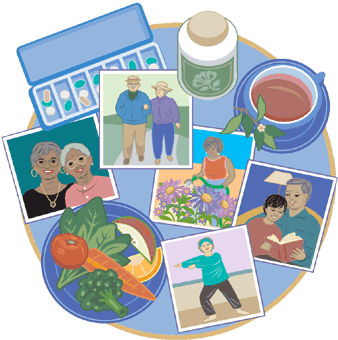Does Personality Affect Longevity
Personality and Longevity

Personality and Aging
Personality tests can tell much about a person and may even be an accurate predictor of other objective events such as longevity, the quality and duration of marriage, job performance, and other overall events.
What does personality have to do with how long a person will live? Longevity, it turns out may have a very big influence on our length of years. Science has done many research studies and the evidence is providing the idea that longevity has as much or perhaps more to do with a person’s mental health, than even their physical health.
The standard explanations about people who are blessed with longevity usually include, a healthy diet, regular exercise, staying away from smoking, excessive drinking and drugs and genetics.
Each of us has a unique personality that typifies who we are. How we spend our time, who we spend our time with, and perhaps, the amount of time we have, are all influenced by who our personality. Our personality has a significant influence on the way we think, the interactions and reactions we have, the things we do, and our behavior.
Longevity and Personality
Do you think personality plays a role in a person's lifespan?
The Science of Personality
Personality may not be a predictor of how long we live, but many research studies are coming to conclusions that our personality does indeed have an effect on our longevity. Some studies are contradictory, some are innovation, and all of them have concluded that there are definitely certain personality traits that contribute to longevity.
The study of longevity is becoming increasingly studied by scientists as they discover what effects our genes, our environment, and our personality have on our length of years.
Many research studies are showing that certain personality temperaments may lead to living longer. Some of the studies differ in what they have determined to be definitive personality traits that lead to longevity.
According to a study done in The Journal of the American Geriatrics Society, involving the personality characteristics of 246 children, whose parents lived to at least the age of 100, researchers found many similarities in personalities. The offspring were chosen instead of the people who lived to be 100 years old themselves, because it was more practical to follow them over a longer period of time, and these children may very well live longer also.
The research study found a correlation between those who lived the longest, as compared to those who had a more normal life span, and certain personality traits, including:
-
being outgoing
-
less neurotic
-
more active
-
empathy
-
cooperative
The study also found that some traits that would normally be considered advantageous to longevity, had no impact.
-
Self discipline had no effect
-
Being open to new ideas made no difference
According to this study, the biggest aspect of personality and longevity had to do with extroversion.
The Study of Personality and Longevity
The study of personality and longevity, is certainly an inexact science. No one knows for sure what a person’s destiny is, and no study can show with absolute certainty that personality is a predictor of longevity. But there may be some correlation between mental health and personality and a person’s ability to grow into old age.
More studies are being done to look for evidence between personality traits and longevity.
Another study done at the Norwegian Institute of Public Health, looked at the personality of the mother and found that this may be a factor in how long their children live. The study, using 28,000 Norwegian mothers, looked at personality traits such as anxiety, depression, anger, and found that these mothers were more likely to feed their children unhealthy diets that were full of sugar, soft drinks, and high carbohydrate foods.
These patterns of childhood eating are usually learned and can be hard to break in adulthood, and might very well affect their health as they age, and impacting how long they live. This study found that depressed mothers had children who did not live as long.
The Influence of Our Personality

Longevity and Conscientiousness
In several other studies done between 1999 and 2006, scientists found that longevity was linked to people who had a higher level of conscientiousness, lower levels of hostility, and had a less distressed type of personality. This study showed that there was limited evidence extroversion, openness, low levels of suppressing emotions, and perceived control had any association with a longer lifespan.
There were mixed findings with people who ranged higher on the neuroticism level. There is a belief that neuroticism may shorten life expectancy.
In a study done by Howard Friedman, Margaret Kern, and Chandra Reynolds, the researchers traced a group of people who were being studied by psychologists from childhood in the San Francisco area. The study began around 1921 and the grade school children were selected for their higher intelligence. Professor Louis Terman, was a well known intelligence researcher during this time period. The participants were measured at age 29 using several personality scales.
In 2007 after 67 years of follow up studied, longevity data was collected. The researchers used the data to find out if personality predicted how long someone will live. Their answer was yes. They found some of the characteristics were the same for both men and women, and some varied by gender. They found that neuroticism and conscientiousness were integral to longevity.
Personality
Genetics and Personality
What do you think is the biggest factor of personality
Being Neurotic
Neuroticism is related to anger, oversensitivity, anxiety, and sadness. Conscientiousness is the opposite of carelessness.
Neurotic people tend to report that they have worse health than emotionally stable people. In this study, as a whole, neuroticism was not related to longevity and that the feelings of anxiety, sadness, hostility didn’t shorten or lengthen a person’s lifespan.
When Friedman and his associates analyzed the data and separated neurotic men from neurotic women, they found neuroticism in men slightly raised the prospect of a longer lifespan and for women it predicted a slightly higher risk of mortality. There were no other studies that found this to be true, so it is not clear why this study came to this conclusion.
This study also found that conscientiousness predicted longevity. The more conscientious the person was, the longer they lived. This result was found in similar studies and the researchers believe that people who are more self controlled follow better standards of living a healthy lifestyle by exercising, eating better, and following what their doctors tell them to do.
Personality Traits, Lifestyle Choices, and Old Age

Personality and the Elderly
Agreeableness is related to compliance, respect for others, harmony, trust, honesty, altruism and compassion for others.
In a study involving the elderly by the Georgia Centenarian Study, it was found that agreeableness protected against mortality over three years. The researchers believe this may be due to low levels of interpersonal antagonism.
Hostility involves low levels of agreeableness and high levels of neuroticism. Agreeableness does not seem to have any correlation to longevity among four different studies that were done. There is no strong study that measured agreeableness and longevity. There was one study that found agreeableness was associated with greater mortality when combined with low conscientiousness.
However, antagonism and angry emotions, which are part of neuroticism creates a hostile personality. This typifies the Type ‘A’ personality and was found in a study to be the main toxic component of the Type ‘A’ personality. Hostility appeared to raise the risk of mortality among male medical students, and some studies found there was no association at all.
Personality Traits
According to researchers at the University of Rochester School of Medicine and Dentistry, Department of Psychiatry, Rochester, NY , there is good evidence that people who are more conscientious, less distressed, and less hostile live longer.
There also is some evidence that shows , people who are extroverted, open to new experiences, don’t suppress their emotions, and have what they view is perceived control over their lives, may also have more length of years than people who are the opposite.
There was mixed evidence that neuroticism shortened life expectancy, and in fact some levels of this aspect may actually be healthy and protective for a longer lifespan. Generally, there seems to be certain personality traits that are significant predictors of longevity.
Genetics and Personality

Personality and Genes
Interleukin (IL) - 6 is an inflammatory marker in the body and is linked to lower conscientiousness in people. Evidence has shown that IL-6 can be linked to chronic stress, and many chronic illnesses, and negative health behaviors. It is also a major predictor of mortality in the elderly.
In the study done at Rochester University, the scientists wanted to know how the Big Five personality traits predicted IL-6 levels in a nationwide five year study. How does personality traits influence a biomarker. The study involved 1,054 people, and that people who ranged high on conscientiousness and neuroticism scale had lower levels of IL-6. This research showed that higher levels of neuroticism when coupled with higher levels of conscientiousness had health benefits.
Neuroticism is also associated with vulnerability, or a sense of not being able to cope with the difficult aspects of life, and which is emotional instability. People who feel they have a sense of control over their lives tend to rate lower on the scale of neuroticism. There also seems to be a very strong correlation between feeling a sense of control and a good self esteem and a feeling like they can do things for themselves.
There is, researchers believe, something they termed as “healthy neuroticism” that actually help people engage in positive and productive healthy activities that may prevent or alleviate the potential for illness and other issues, chronic or otherwise. Some people who have more anxiety, but don’t have a poor ego, don’t feel vulnerable, or suffer from depression may fit into the healthy neuroticism category.
On the other hand, neurotic people can have unfounded complaints and sensitivity to suspected, but unfounded body sensitivity. Although this may help healthcare providers prevent early mortality, it is also associated with a reduced quality of life.
There have many studies that have been conducted that have tried to identify links between personality and longevity by looking at diet, exercise or lack there of, drinking habits and other health behaviors. Some recent studies have tried to include health provider care as part of behavior that may lead to longevity.
Are there personality genes?

Personalities and Lifestyle Choices
What makes some people make choices that lead to a healthier lifestyle? What makes some people choose to go to doctors more than others.
It is widely accepted that people who have a healthier lifestyle, are more engaged socially, and do more physical activity, do live longer. What is it, in our personalities that motivate some of us, and not others to adopt better habits or shun the bad ones?
While science knows genetics is linked with longevity, our personality may also be connected to our DNA. So it leaves the question, does our personality affect our longevity, or is our longevity determined by our genes, which determine our personality?
www.AboutPersonalities.com
For more information about personalities go to www.aboutpersonalities.com







